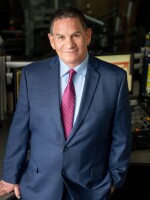His memories of his homeland are limited. But, that also means he doesn’t remember some of the horrors he, and his families experienced at the hands of Nazi Germany during the early stages of the Holocaust.
"My mother actually sent me over to Great Britain in June of 1939, so I was just about two weeks before my third birthday," said Michael Wolff. "My first memories are being with my foster family."
Wolff was born in what was Breslau, Germany in 1936. It’s now a part of Poland. When he was two, Kristallnacht occurred. It was two days in November of 1938 when the Nazis orchestrated attacks on Jews. Some consider it to be the start of the Holocaust, the murder of more than six million European Jews.
Synagogues were burned, and Jewish owned stores vandalized. Wolff's father was arrested.
Still, the young boy would become one of the lucky ones, one of the children to escape the grasp of the Nazis, and their concentration camps.
His mother got him into Kindertransport, an ambitious plan to get thousands of at-risk children out of Germany to foster families in Great Britain.
But, it wouldn’t be easy. Imagine being the parent of a young child, sending them to another country to be cared for by someone you’ve never met.
Wolff says he can't imagine what it was like for his mother, not knowing if she would ever see her son again.
He says miraculously, his mother and father also were able to leave Nazi Germany. She got him out of jail, and he went to England. The only place she could get a permit to go was Bolivia. She went there, and eventually they all reunited in South America.
The Santa Barbara man says while his mother and father saw the danger, other members of their family didn’t.
"She wanted my aunt, and grandfather to go with her, but they didn't want to go. They wanted to stay," said Wolff. "My grandfather fought in World War I, and said 'They're not going to do anything to me. I'm a veteran.' "
It was only at the end of the war in Europe that they were able to find out what had happened to their relatives that had stayed in Germany. The aunt was murdered at the Auschwitz concentration camp, and his grandfather died at another concentration camp.
Wolff’s family lived in Bolivia for a decade, as they tried to get papers to move to America. In the 1950’s, they came to America, settling in the Bay Area. Wolff went to high school and college there, becoming an engineer.
He and his wife moved to Santa Barbara in 1970. They had a son and daughter, and have four grandchildren, and three great grandchildren.
Wolff is now 85. He says he’s been lucky to have survived, and had such a good life when so many others died. Wolff says it’s important we don't forget what happened.
He says despite the horrors of what happened, antisemitism has never really gone away, and he's concerned that we're seeing a surge in hate crimes.
"People are denying that this happened. We started telling our stories because we want to warn people what could happen," said Wolff. "It starts with a lie. The Nazis blamed Germany's economic problems on the Jews, and when the lie was told enough time, people believed it."



